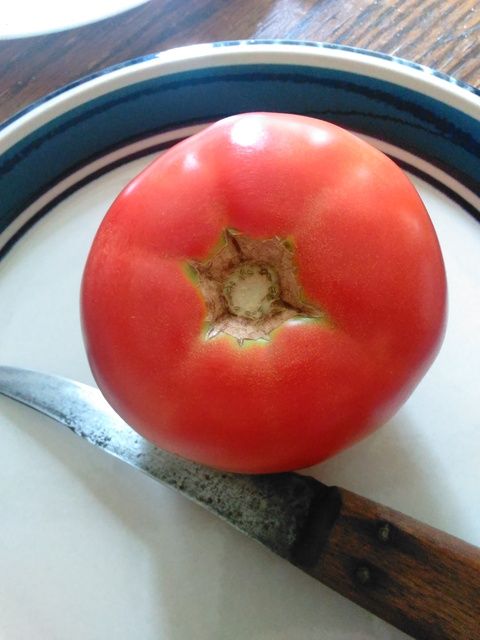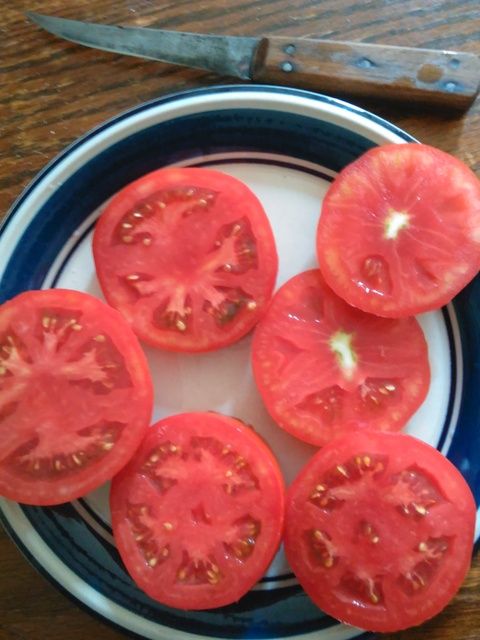

|
Member discussion regarding the methods, varieties and merits of growing tomatoes.
|
 |
|
|
Thread Tools | Display Modes |
|
|
|
|
#1 |
|
Tomatovillian™
Join Date: Mar 2012
Location: Ottawa, ON
Posts: 128
|
Hello all,
I was wondering if anyone else has seen this (see photo) in their tomatoes. On the inside of the tomato, just underneath the skin, the flesh is white. I suspect, uninformed, to much or wrong kind of fertilizer. Salaam 
|
|
|

|
|
|
#2 |
|
Tomatovillian™
Join Date: Feb 2012
Location: Newfoundland, Canada
Posts: 6,794
|
I suspect that a potassium deficiency could be responsible.
Potassium deficiency is implicated in fruit defects like grey wall, uneven ripening etc. It can also happen when there's not enough sunshine, plants too crowded to get enough light, and when it's too cold for the plant to take up potassium. |
|
|

|
|
|
#3 |
|
Tomatovillian™
Join Date: Feb 2006
Location: MA
Posts: 4,971
|
Internal white tissue - I get this in many of the reds I trial, but rarely in any other colors. High temps at ripening is believed to be one of the main causes.
In my garden, every tomato I've ever tasted, that had internal white tissue, has been bland. So, when I cut one open and it has the white areas, its either straight to just saving seeds and tossing the rest, or it's to the stock pot for sauce. |
|
|

|
|
|
#4 | |
|
Tomatovillian™
Join Date: Jul 2014
Location: kentucky
Posts: 1,116
|
Quote:
It is actually a disorder of the growing immature fruit, it's just not noticed until the ripe fruit is cut. It is caused by the plant not being able to take up potassium, or potassium is deficient. I battled this years ago in my high tunnels, and I didn't stop until I figured it out. I had it narrowed down to potassium, so I added more the next year. It didn't help, and I became frustrated. Then one day it just dawned on me out of the clear blue. The plants couldn't use the K they needed because I wasn't applying enough water! From that point I've never looked back! I've learned tomatoes are identical to new born babies, they need constant attention to grow strong and healthy. Only a baby will cry to let you know what they need, a tomato can't, so we have to learn when and where they need the constant attention by sight. An old greenhouse tomato book I own says K is the most important nute to the fruit, and should be applied extra heavy, because it is to late when the crop has to be discarded. I pretty much took that advice to heart.. Now I apply extra K in the base fertilizer at planting. Then when the plants are setting, I apply more through irrigation. And NEVER let the soil or container become dry at any point during fruit set and maturity. I have had zero issues with this disorder for many years now! It is amazing to see and taste the difference in a healthy fruit. The color is better, the walls are thicker and juicier, and the flavor is better. I've had customers tell me unlike others tomatoes, mine have NO waste at the shoulder! 
|
|
|
|

|
|
|
#5 |
|
Tomatovillian™
Join Date: Feb 2012
Location: Newfoundland, Canada
Posts: 6,794
|
Excellent link, gorbelly, very interesting.
Tormato, I'll ditto that the affected fruit are sauce pot material at best. Speaks loudly to the role of K in development of tasty sweet fruit. Last season I had a K deficiency tragedy affecting a lot of the red, pink and beta orange fruit over a certain size. Caused in my case by cold and lack of light. Other farmers who grow tomatoes were affected in the same way, so could not be linked to a soil deficiency or lack of ferts but instead weather related. Very interested to read about the link to fruit load that was noticed in the Maryland case. This might help to explain why the small fruit and cherries weren't affected. In fact they were awesomely tasty and sweet. The larger fruit were loaded up and looked perfect until they started to ripen. There were exceptions and some were more affected than others - genetics definitely plays a role in susceptibility. My lessons in hindsight: avoid overcrowding (humph... not easy! um.. not really done  ) )Also, for cold soil effects I would try WARM solution of blackstrap molasses or kelp extract which also provides a stream of soluble K. Been doing that as part of the fert regime this year. Now that I mention it, time for another round of blackstrap, especially for those larger fruited, heavy laden and not yet ripening ones.  Timely reminder. Timely reminder. 
|
|
|

|
|
|
#6 |
|
Tomatovillian™
Join Date: Feb 2012
Location: Newfoundland, Canada
Posts: 6,794
|
I missed your reply while I was posting Hellmans. Thanks for the tip about water!
I will take this advice to heart. |
|
|

|
|
|
#7 |
|
Tomatovillian™
Join Date: Feb 2012
Location: Newfoundland, Canada
Posts: 6,794
|
Same author (Jerry Brust) as the original link by gorbelly, 2016 article, recommending liquid K ferts/ fertigation for this problem.
http://vegetablegrowersnews.com/news...-high-tunnels/ |
|
|

|
|
|
#8 | |
|
Tomatovillian™
Join Date: Jul 2014
Location: kentucky
Posts: 1,116
|
Quote:
I grow in plastic mulch with drip irrigation, and when asked just how much water I use; I say that at anytime during fruit growth, I like to be able to push my fingers to my knuckles into the soil. Here is a sample of my fruits interior quality.  
|
|
|
|

|
|
|
#9 |
|
Tomatovillian™
Join Date: Jul 2015
Location: Southeastern Pennsylvania
Posts: 1,069
|
This is a nice discussion of ripening disorders and the role of K and the interaction with climate/weather. Like Ca and BER, it's probably not necessarily about deficiency in the soil but about problems with the plant's ability to take it up/utilize it.
|
|
|

|
|
|
#10 |
|
Tomatovillian™
Join Date: Mar 2012
Location: Ottawa, ON
Posts: 128
|
Well, thanks for all the answers.
I should add that the weather here has been unusually hot all spring and summer - very little rain. And over the past few weeks, hot and dry, instead of humid, something I've never seen here. Other changes from last year, when I didn't have this problem, is that I watered more this year, especially in spring, and I'm using one different fertilizer and more of it than last year. Finally, there seems to be more disease (I don't know what disease, but leaves are dying) than last year, and I'm guessing it might be because of lack of rotation. No overcrowding - I've left plenty of space around the plants. |
|
|

|
|
|
#11 |
|
Tomatovillian™
Join Date: Jun 2010
Location: Romania/Germany , z 4-6
Posts: 1,582
|
I kinda notice that this seems a hot/high sun period problem (mostly), much less so when it's too cold. And also taste seems to be affected heavily, which is my main gripe (poor, grassy taste, texture is also not that good).
Hellmanns' advice is great. Don't keep your tomatoes on the dry side thinking they will become watery otherwise, having sufficient water during night time is crucial to tomato fruit growth and taste. You can avoid wateriness by increasing soil EC (by extra fertilizing). Also avoid sunscald. It will make inedible shoulders no matter what (use shading cloth, have heavy healthy foliage, etc) |
|
|

|
|
|
#12 |
|
Tomatovillian™
Join Date: Feb 2012
Location: Newfoundland, Canada
Posts: 6,794
|
Both cold and heat can be an issue for me in the greenhouse. I have a tendency not to water the plants if we have a cool rainy spell - sometimes the soil has gotten quite dry while the environment has remained humid. I'll try to avoid that in future, and keep the soluble K flowing.
Hellmans I'd be proud to take that tomato to market.  Last year.... so many of the larger fruit were just not market quality. I sold very little, as I sure don't want to put inferior quality on the market.... and had more homemade sauce than I ever bothered with before. Not really in a saucy mood so I hope that doesn't happen again this season. Last year.... so many of the larger fruit were just not market quality. I sold very little, as I sure don't want to put inferior quality on the market.... and had more homemade sauce than I ever bothered with before. Not really in a saucy mood so I hope that doesn't happen again this season.  
|
|
|

|
|
|
#13 | |
|
Tomatovillian™
Join Date: Jul 2014
Location: kentucky
Posts: 1,116
|
Quote:

|
|
|
|

|
|
|
#14 |
|
Tomatovillian™
Join Date: Jun 2013
Location: Wasilla Alaska
Posts: 2,010
|
I agree with Bower that is the effect of K deficiency. The green core in the other photo mat not be nothing but a core, but the uneven ripening is usually K problems.
|
|
|

|
|
|
#15 |
|
Tomatovillian™
Join Date: Jul 2008
Location: 6a - NE Tennessee
Posts: 4,538
|
I've noticed that some varieties are prone to keeping both green and white material inside them until very late in the ripening process. Up to now, I have always allowed these varieties to ripen further and this usually eliminates the white and green material. Many of the older varieties are prone to this and the old catalogs had a lot of descriptions of this or that tomato having a small core area when ripe. So, the DNA is in place for many to have this characteristic of a large or small or no "core" material evident in ripe fruit.
Some examples of varieties with more "core" material are the Dwarfs Sleeping Lady and Perth Pride. I have seen this in large indeterminate plants like "Large Red" and others. My conclusion has always been that this "core" material is present in lots of tomatoes both old and new. While I can see that a deficiency in Potassium can aggravate this condition, I don't think it is the only thing causing it. I believe that it is also built into the DNA of some varieties, and may be the ability of the plant to take up the Potassium rather than a deficiency of Potassium in the growing medium.
__________________
Ted ________________________ Owner & Sole Operator Of The Muddy Bucket Farm and Tomato Ranch |
|
|

|
 |
|
|
